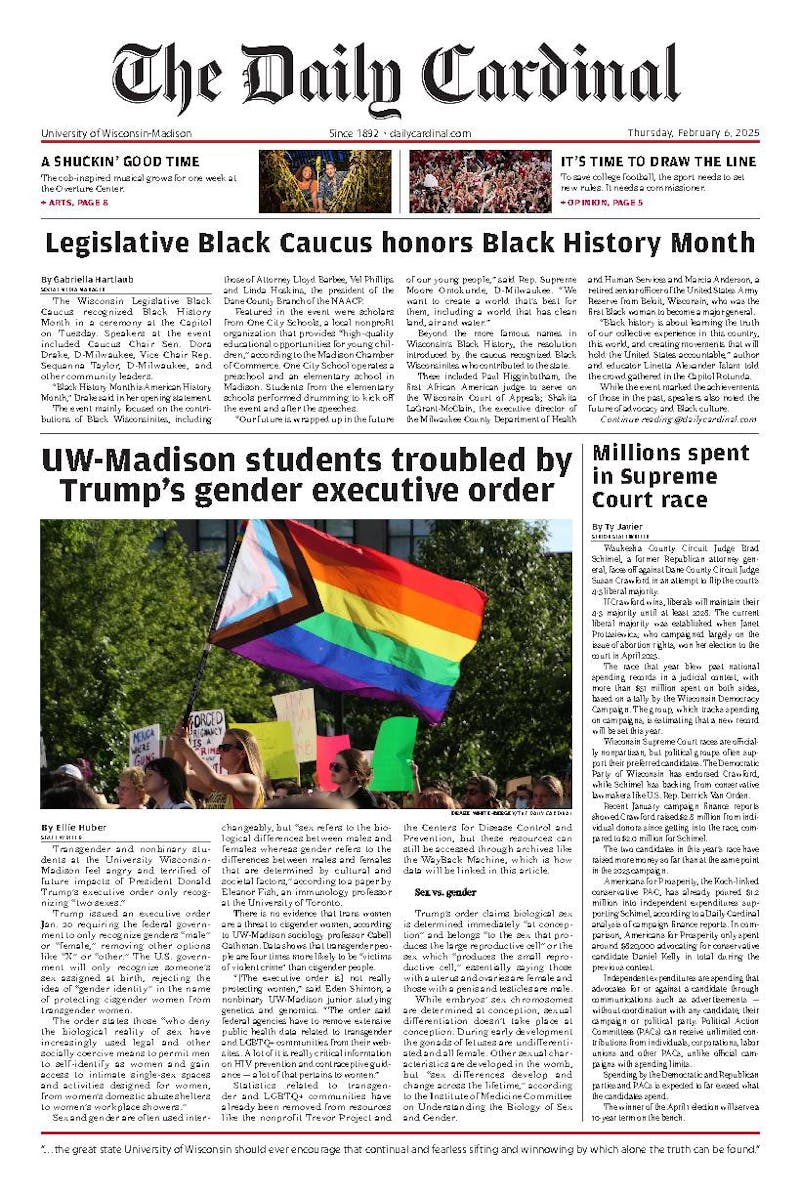When the Joint Finance Committee passed the bill limiting collective bargaining rights for public employees late Feb. 16, 2011, Sen. Minority leader Mark Miller, D-Monona, told state Sen. Chris Larson, D-Milwaukee, to bring an extra shirt and a toothbrush to Thursday morning’s caucus.
“I said ‘okay, I don’t know what that means but alright,’” Larson recalled.
The next morning, Democratic senators met at the Democratic Party of Wisconsin headquarters on King Street. Instead of preparing for their session that day in the Capitol, they planned to drive as far from the building as they could.
At the meeting, Miller proposed they leave the state to stall a vote on Walker’s budget repair bill which Democrats said Republicans were pushing too quickly through the state Legislature.
“Everyone had to agree … that we would get out of the state for at least that morning,” said state Sen. Fred Risser, D-Madison, who has served in the Wisconsin State Legislature since 1956. “It was a consensus decision.”
They could prevent a vote on the bill if all 14 of them left the state and deprived the senate of the 20 members required to be present for budget-related bills.
“It’s an option that’s something very rare and only used in extreme situations.” Larson said. “In this scenario it would require all of us to be gone.”
The Capitol erupted Thursday when protesters spread the news the 14 senators were not present during the Senate session’s roll call. For the next 23 days, they traveled throughout northern Illinois, intent on stalling the bill.
Those who supported the senators called them the “Fab 14.” But Walker supporters called them irresponsible for leaving the state and saw their actions as reprehensible enough they deserved to be recalled.
At a press conference, Walker said the Senate could not move forward unless the senators came to session.
“They get paid to come to work and they should be coming to work,” Walker said. “We’re responsible of voting on behalf of our constituents. You can’t do that if you’re hiding out in some other state.”
Walker’s administration sent Wisconsin State Patrol to senators’ houses to ask their families of their whereabouts.
Although they spread across northern Illinois, they met each day to decide if they should return.
Risser said even though the senators argued about their exit strategy, staying together was a major accomplishment.
“Fourteen egos, of such varied personalities … were able to stick together for three weeks,” Risser said. “You don’t have that happen very often.”
While Risser acknowledged his district supported him in Illinois, not all districts fully supported their senators. State Sen. Tim Cullen, D-Janesville, noted more than half of his district was against him going to Illinois.
“It was harshly, sharply divided. There didn’t seem to be anybody undecided about it,” Cullen said.
He said he sometimes advocated returning sooner because he thought they already made their point.
“There was real logic in going down there for 10 days at least. The state did wake up.” Cullen said.
But he said they could not fuel the movement from outside Wisconsin.
“If 14 people stay in Illinois forever then it’s not really a real movement. It needed to have its own energy behind us being here,” Cullen said.
Media groups contacted them to find out when they would return, but Risser said their exit strategy changed constantly based on new developments in Madison.
As days turned into weeks, Senate Republicans created resolutions to pressure Democrats to return. After March 2, they would fine any senator $100 for missing a session without reason. When the 14 failed to return by March 4, Senate Republicans ordered to detain any of them if they stepped foot back in Wisconsin on charges of disorderly conduct and contempt.
However, many of the senators snuck back for a change of clothes or time with their families.
“We were somewhat careful about it. We … didn’t parade around town or anything like that,” Cullen said.
As the youngest senator, Larson became the “de facto news source” and updated senators on happenings in Madison with his smartphone.
“There was actually a pretty big disconnect for some of the senators of what was actually going on in Wisconsin and what their perception of it was,” Larson said. “I felt very strongly it was up to me and a few others to make sure that people were informed.”
Even so, Cullen said being far from the Capitol made it difficult to grasp the crowd’s emotion.
Republican senators were able to pass the collective bargaining portions of the budget repair bill separately March 9 since bills not related to the budget do not require 20 senators present. The Democratic senators then decided it was time to come home.
“Once they already passed it, there was no purpose in staying out there any longer,” Risser said.
Although those on both sides of the collective bargaining debate disagreed on whether the Democratic senators were just in their actions, the volatile political climate that pushed them to leave the state was undeniably rare.
“I’ve been in the senate now for 50 years and nothing like this has happened before and nothing like this will ever happen again,” Risser said.






